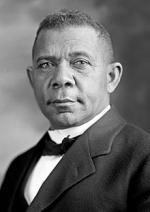Disable ads!
Booker T. Washington
Slavery Contemporary Child labour Conscription Debt Forced marriage Bride-buying Wife selling Forced prostitution Human trafficking Peonage Penal labour Sexual slavery Historical Antiquity Ancient Rome Babylonia Ancient Greece Topics and practices Atlantic slave trade Middle Passage Arab slave trade Ghilman Mamluk Saqaliba Aztec Blackbirding Byzantine Empire Coolie Corvée labor Field slaves in the United States House slaves Kholop Medieval Europe Panyarring Thrall Serfs History Russia Slave raiding Naval Galley slave Impressment Pirates Shanghaiing Slave ship By country or region Africa Contemporary Africa Slavery on the Barbary Coast Barbary slave trade Slave Coast Angola Chad Ethiopia Mali Mauritania Niger Somalia South Africa Sudan Seychelles Americas Americas indigenous U.S. Natives Brazil Lei Áurea Canada Caribbean Barbados Code Noir Cuba Haiti revolt Restavec Latin America Puerto Rico Trinidad United States colonial maps female partus penal labor Slave codes interregional Human Trafficking Virgin Islands Asia Bhutan China Booi Aha Laogai India Debt bondage Chukri System Japan comfort women North Korea Vietnam Yemen Australia and Oceania Blackbirding in Australia Human trafficking in Australia Slave raiding in Easter Island Human trafficking in Papua New Guinea Blackbirding in Polynesia Europe Sex trafficking in Europe British Isles Denmark Dutch Republic Germany in World War II Poland Portugal Romania Russia Spain colonies Sweden Middle East and North Africa Iran Libya Ottoman Empire Religion Bible Christianity Islam 21st century Judaism Opposition and resistance Timeline Abolitionism U.K. U.S. Anti-Slavery International Blockade of Africa U.K. U.S. Compensated emancipation Freedman manumission Freedom suit Abolitionists Slave Power Underground Railroad songs Slave rebellion Slave Trade Acts International law Related Common law Indentured servant Unfree labour Fugitive slaves laws Great Dismal Swamp maroons List of slaves owners Slave narrative films songs Slave name Slave Route Project Treatment in U.S. breeding court cases Washington Jefferson Adams Lincoln 40 acres Freedmen's Bureau bit Wage slavery Emancipation Day v t e Booker Taliaferro Washington (April 5, 1856 – November 14, 1915) was an African-American educator, author, orator, and advisor to presidents of the United States. Between 1890 and 1915, Washington was the dominant leader in the African-American community. Washington was of the last generation of black American leaders born into slavery and became the leading voice of the former slaves and their descendants, who were newly oppressed by disfranchisement and the Jim Crow discriminatory laws enacted in the post-Reconstruction Southern states in the late 19th and early 20th centuries. In 1895 his Atlanta compromise called for avoiding confrontation over segregation and instead putting more reliance on long-term educational and economic advancement in the black community. His base was the Tuskegee Institute, a historically black college in Alabama. As lynchings in the South reached a peak in 1895, Washington gave a speech in Atlanta that made him nationally famous. The speech called for black progress through education and entrepreneurship. His message was that it was not the time to challenge Jim Crow segregation and the disfranchisement of black voters in the South. Washington mobilized a nationwide coalition of middle-class blacks, church leaders, and white philanthropists and politicians, with a long-term goal of building the community's economic strength and pride by a focus on self-help and schooling. Secretly, he supported court challenges to segregation. Black militants in the North, led by W. E. B. Du Bois, at first supported the Atlanta compromise but after 1909 they set up the NAACP and tried with little success to challenge Washington's political machine for leadership in the black community. Decades after Washington's death in 1915, the Civil Rights movement generally moved away from his policies to take the more militant NAACP approach. Booker T. Washington mastered the nuances of the political arena in the late 19th century which enabled him to manipulate the media, raise money, strategize, network, pressure, reward friends and distribute funds while punishing those who opposed his plans for uplifting blacks. His long-term goal was to end the disfranchisement of the vast majority of African Americans living in southern states, where most of the millions of black Americans still lived.
 Read more on wikipedia.org Read more on wikipedia.org
 All quotes by Booker T. Washington All quotes by Booker T. Washington
 Edit Edit
|

|
|
|
|
|
Background photo by Giuliana
|